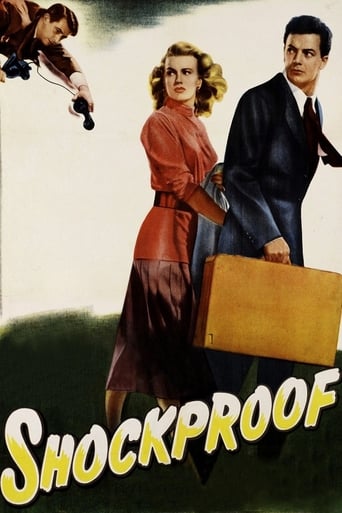LeonLouisRicci
It's difficult to believe, but even by this Early Date of 1949 the Cynicism and Doom Laden Tropes of Film-Noir were becoming unacceptable for the Safe and Conservative Studio Heads. Sam Fuller's Script was stripped of its edginess and coated with a sweetness Ending. Neither Fuller nor Director Douglas Sirk were pleased and voiced Their disapproval loudly.But the Power of Low-Rung, untested Writers and Directors was Minimal. So what remains is a Soapy Triangle with enough Artistic Insight to be passable and somewhat enjoyable, but hardly Pure Film-Noir and the impact is diluted and disappointing.Cornel Wilde as the Parole Officer and Patricia Knight have and unexpected collision of Love's vice like grip and its ability to change People drastically. John Barangay as the Ex-Lover is Bland and really doesn't do much to attract audiences to His vile villainy but is good enough. Wilde, not the best Actor in the World does have a Physical Presence and was Drop Dead Handsome. Knight was as Stiff as They Come and had a limited Career and tries mightily here but was betrayed by Her Talent and got by on Her slightly Off-Beat Beauty.Overall, Worth a Watch for Sirk and Fuller, but must be Footnoted as mishandled by Studio Interference. Film-Noir Fans and Fuller Cultists might be disappointed. A Film-Noir only in a Wide Definition of the Genre.
Martin Teller
A parole officer falls for one of his charges, but is she playing him for a sucker? Not so much a noir as a noir-esque romantic melodrama, and not up to the level of the best from either director Douglas Sirk or writer Sam Fuller. The story could have gone one of two ways, and it chose the less interesting path (from what I've read, this might have been a studio decision). However, Cornel Wilde and Patricia Knight (actual spouses at the time) handle their performances quite well, and play off each other with conviction and chemistry. The script has some nice touches, the photography is pretty sharp, and the supporting roles are good. It's certainly a watchable movie, just rather bland... and it wraps up far too easily.
dougdoepke
If the movie were an airplane, then it wobbled a lot before finally crashing and burning with an utterly illogical ending. Up to that point, this crime drama is mediocre at best. The best part follows the couple (Wilde and Knight) as they flee the cops after running out on Knight's parole and in the process sinking into society's lower depths. That 20 minute sequence is done with both flair and zip. Director Douglas Sirk is known for artistic soap opera, so it's not surprising that this film emphasizes the love story over the crime element. The trouble is that Wilde is woodenly uninvolving, while Knight's character remains muddled, to say the least. A key part of the plot lies in tracking her evolving emotions. But that's hard to do since these developments are confusingly portrayed, helped neither by the turgid script nor by Knight's thespic limitations. Apparently cult movie-maker Sam Fuller co-authored some of the screenplay, which, on the face of it, seems hard to believe. Nonetheless, I'm sure he had nothing to do with the ridiculous climax that instead smacks of outside interference of the most thoughtless kind.Calling this a noir film is, I think, a stretch. It's certainly not filmed as noir, with none of the usual trademark light and shadow. True, the plot contains a number of noirish elements, but Sirk's style doesn't bring these out in recognizably noir fashion. Even so, the many SoCal location shots are both entertaining and appropriate for crime drama. (Too bad we don't get more of the dingy oil field setting, which has definite and exotic noir potential.) But noir or not, this is a rather poorly done crime drama, having neither the force nor the panache of the better examples of the period. With better casting, a more cogent screenplay, and more attention to the oil field, this could have been a memorable film.
marcslope
Like other early Douglas Sirks, this noir doesn't delve very far into his later themes of American hypocrisy or false values, and it has none of the visual flair for which he became known. It's just a mild, casually plotted melo about a parole officer who falls for his charge and ends up on the lam with her. Wilde, though he was then married to his pretty leading lady, Patricia Knight, doesn't seem very interested in her, and the rest of the no-name cast is trapped in a web of poor character motivations and listless dialog. The resolution is, as another poster noted, hilariously out of left field -- that character would never do that. On the plus side, we get some nice shots of 1948 L.A., and a few scenes in an oil field camp with one-room worker shacks feel authentically gritty and mid-century. But as a romance, it's unconvincing, and as a noir, it's without thrills.



